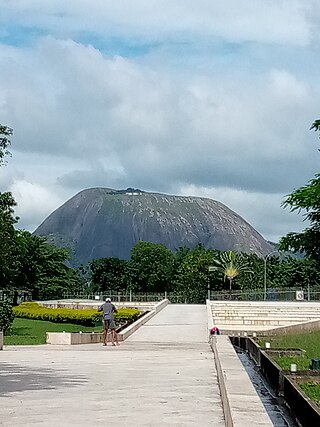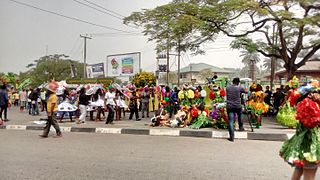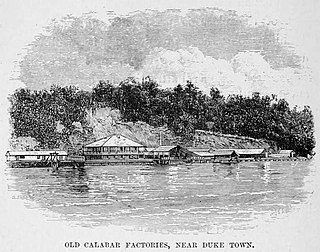
This is a list of rivers of Nigeria . [1] This list is arranged by drainage basin and from west to east, with respective tributaries indented under each larger stream's name. [2]

This is a list of rivers of Nigeria . [1] This list is arranged by drainage basin and from west to east, with respective tributaries indented under each larger stream's name. [2]

The history of Nigeria can be traced to the earliest inhabitants whose remains date from at least 13,000 BC through early civilizations such as the Nok culture which began around 1500 BC. Numerous ancient African civilizations settled in the region that is known today as Nigeria, such as the Kingdom of Nri, the Benin Empire, and the Oyo Empire. Islam reached Nigeria through the Bornu Empire between and Hausa Kingdom during the 11th century, while Christianity came to Nigeria in the 15th century through Augustinian and Capuchin monks from Portugal to the Kingdom of Warri. The Songhai Empire also occupied part of the region. Through contact with Europeans, early harbour towns such as Calabar, Badagry and Bonny emerged along the coast after 1480, which did business in the transatlantic slave trade, among other things. Conflicts in the hinterland, such as the civil war in the Oyo Empire, meant that new enslaved people were constantly being "supplied".

Benue–Congo is a major branch of the Volta-Congo languages which covers most of Sub-Saharan Africa.

Osogbo is a city in Nigeria. It became the capital city of Osun State in 1991. Osogbo city seats the Headquarters of both Osogbo Local Government Area and Olorunda Local Government Area. It is some 88 kilometers by road northeast of Ibadan. It is also 108 kilometres (67 mi) by road south of Ilorin and 108 kilometres (67 mi) northwest of Akure. Osogbo shares boundaries with Ikirun, Ilesa, Ede, Egbedore, Ogbomosho and Iragbiji and it is easily accessible from any part of the state because of its central nature. It is about 48 km from Ife, 32 km from Ilesa, 46 km from Iwo, 48 km from Ikire and 46 km from Ila-Orangun; the city had a population of about 200,000 people and an approximate land area of 126 km. The postal code of the area is 230.
Iwo is a city in Osun State, Nigeria. The Iwo people, like all other people of the Yoruba kingdom, are said to have originated from Ile-Ife, where they migrated sometimes in the 11th century according to Alademomi kenyon and Prince Adelegan Adegbola (2009). The only predicted land with the symbol of the parrots is the Iwo kingdom. The city was formerly part of old Oyo state and was later separated and became one of the major townships in Osun State, Nigeria.

Cross River State is a state in the South-South geopolitical zone of Nigeria. Named for the Cross River, the state was formed from the eastern part of the Eastern Region on 27 May 1967. Its capital is Calabar, it borders to the north through Benue state, to the west through Ebonyi state and Abia state, and to the southwest through Akwa Ibom state, while its eastern border forms part of the national border with Cameroon. Originally known as the South-Eastern State before being renamed in 1976, Cross River state formerly included the area that is now Akwa Ibom state, which became a distinct state in 1987.

Calabar is the capital city of Cross River State, Nigeria. It was originally named Akwa Akpa, in the Efik language, as the Efik people dominate this area. The city is adjacent to the Calabar and Great Kwa rivers, and the creeks of the Cross River.

Osun State, occasionally known as the State of Osun by the state government, is a state in southwestern Nigeria; bounded to the east by Ekiti and Ondo states for 84 km and for 78 km respectively, to the north by Kwara State for 73 km, to the south by Ogun State for 84 km and to the west by Oyo State, mostly across the River Osun. Named for the River Osun—a vital river which flows through the state—the state was formed from the southeast of Oyo State on 27 August 1991 and has its capital as the city of Osogbo.

The University of Calabar is a federal university situated in Calabar, Cross River State, Nigeria. It is one of Nigeria's second-generation federal universities. The University of Calabar was a campus of the University of Nigeria until 1975. The present Vice Chancellor is Dr. Florence B. Obi (Professor). The post of the DVC (Academic) is held by Dr. Angela Oyo Ita (Professor), while Dr. Grace Eno Nta (Professor) is the current DVC (Administration).

Ìlá Òràngún is an ancient city in Osun State, Nigeria, that was the capital of an ancient city-state of the same name in the Igbomina area of Yorubaland in south-western Nigeria. Ìlá Òràngún is more populous than its sister-city, Òkè-Ìlá Òràngún, a town located about 7.5 miles (12 km) to the northeastern corner of Osun State. The latitude and longitude coordinates of Ila Orangun are 8.019116 and 4.901962 respectively. According to the information obtained from GeoNames geographical database, the population of Ila Orangun in Osun State, Nigeria is 179,192.

The Kalabari are a sub-group of the Ijaw people living in the eastern Niger Delta region of Nigeria. Originally, they were known as the Awome. The name Kalabari was derived from their ancestor Perebo Kalabari who was a son of Meinowei. Their original settlement was spelt as Calabar by the Portuguese which was pronounced Kalabari. This settlement (town) was abandoned as the people moved to other fishing settlements. Portuguese settlers continued to maintain the name Calabari which became surrounded by the Efik people of Duke town. When the British came the word Calabari was pronounced as Calabar (Kalaba) instead of Kalabari. At this time the original Ijoid Kalabaris had moved to a new location which became the new Calabar territory since the old Calabar is occupied by different people. Old Calabar became an Efik town with time which has the name Calabar.
Irepodun/Ifelodun is a Local Government Area of Ekiti State, Nigeria. Irepodun/Ifelodun is predominantly a homogeneous society and carefully populated by Yoruba speaking people of the South West of Nigeria. It has an area of 356 km2 and a population of 129,149 at the 2006 census. The major religions of the people are Christianity and Islam while a percentage of the people are traditional religion worshippers.
Ife South is a Local Government Area in Osun State, Nigeria. Its headquarters are in the town of Ifetedo at 7°11′00″N4°42′00″E.

Calabar Carnival is an annual carnival held in Cross River State, Nigeria. Also known as Africa's Biggest Street Party, the carnival holds every December and was declared by the then governor of Cross River State, Mr. Donald Duke as an activity to mark Christmas celebration yearly. He said his vision for creating the festival was to make Cross-River a home of tourism and hospitality in Nigeria and Africa. The quality of the festival has grown over the years making it Nigeria's biggest carnival and an internationally recognized festival. It used to be a month-long event that began on the 1st of December, until the former governor of the state, Benedict Ayade reduced it to two weeks after he was elected. During the 2017 carnival, Former governor Benedict Ayade said in his speech that the carnival is to showcase Africa as the richest continent and a blessed place where the young ones should be proud to belong. The carnival has always been entertaining and colourful as different competitions take place and huge cash prizes are won. Calabar which is also known by the name Canaan City, is a city in south-eastern Nigeria. Calabar is actually the capital city of Cross River State. Calabar sits adjacent to the Calabar and Great Kwa Rivers and Falls as well as the creeks of the Cross River.

Duke Town, originally known as Atakpa, is an Efik city-state that flourished in the 19th century in what is now southern Nigeria. The City State extended from now Calabar to Bakassi in the east and Oron to the west. Although it is now absorbed into Nigeria, traditional rulers of the state are still recognized. The state occupied what is now the modern city of Calabar.

Cross River is the main river in southeastern Nigeria and gives its name to Cross River State. It originates in Cameroon, where it takes the name of the Manyu River. Although not long by African standards its catchment has high rainfall and it becomes very wide. Over its last 80 kilometres (50 mi) to the sea it flows through swampy rainforest with numerous creeks and forms an inland delta near its confluence with the Calabar River, about 20 kilometres (12 mi) wide and 50 kilometres (31 mi) long between the cities of Oron on the west bank and Calabar, on the east bank, more than 30 kilometres (19 mi) from the open sea. The delta empties into a broad estuary which it shares with a few smaller rivers. At its mouth in the Atlantic Ocean, the estuary is 24 kilometres (15 mi) wide. The eastern side of the estuary is in the neighboring country of Cameroon.

The Calabar River in Cross River State, Nigeria flows from the north past the city of Calabar, joining the larger Cross River about 8 kilometres (5.0 mi) to the south. The river at Calabar forms a natural harbor deep enough for vessels with a draft of 6 metres (20 ft).

The Great Kwa River flows through Cross River State, Nigeria, draining the east side of the city of Calabar. The river ecology is under threat from human activity.
Events in the year 2022 in Nigeria.
The Calabar Monorail is an abandoned monorail system in Calabar, state capital of Cross River state, Nigeria. The single-track, 1.1 kilometres (0.68 mi) line runs from the Calabar International Convention Centre to the Tinapa Resort. The project was initiated by the former governor of Cross River state, Senator Liyel Imoke and completed by successor Benedict Ayade.